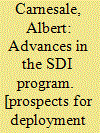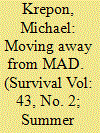| Srl | Item |
| 1 |
ID:
002655


|
|
|
|
|
| Publication |
Washington, American Association for the Advancement of Science, 1987.
|
| Description |
iv, 67p.
|
| Series |
American association for the Advancement of Science
|
|
|
|
|
|
|
|
|
|
|
|
Copies: C:1/I:0,R:0,Q:0
Circulation
| Accession# | Call# | Current Location | Status | Policy | Location |
| 034066 | 358.174/CAR 034066 | Main | On Shelf | General | |
|
|
|
|
| 2 |
ID:
001080


|
|
|
|
|
| Publication |
New Jersey, Prentice Hall, 1997.
|
| Description |
xx, 287p.
|
| Standard Number |
0135916372
|
|
|
|
|
|
|
|
|
|
|
|
Copies: C:1/I:0,R:0,Q:0
Circulation
| Accession# | Call# | Current Location | Status | Policy | Location |
| 040584 | 327.16/FIS 040584 | Main | On Shelf | General | |
|
|
|
|
| 3 |
ID:
019452


|
|
|
|
|
| Publication |
2001.
|
| Description |
p81-95
|
|
|
|
|
|
|
|
|
|
|
|
|
|
|
|
| 4 |
ID:
143307


|
|
|
|
|
| Summary/Abstract |
Since 2002, NATO's territorial missile defense has evoked continuous debates between NATO states and the Russian Federation. Thirteen years have passed without reaching a common denominator. This article provides a comprehensive overview of the historical background of the debate and the technical details of the missile defense system, highlighting its shortcomings and the state of its deployment process. It also contrasts the military-technical and political arguments of both sides, before addressing the applicable norms of international law to highlight violations and the effect of this noncompliance on existing arms control measures.
|
|
|
|
|
|
|
|
|
|
|
|
|
|
|
|
| 5 |
ID:
098784


|
|
|
|
|
| Publication |
2010.
|
| Summary/Abstract |
A significant and growing body of literature related to security regimes focuses on the importance of either common knowledge or common norms to the success of efforts to limit military competition. This paper challenges this central pillar of the arms control literature. Security regimes, in particular arms control regimes, are not necessarily the product of common knowledge, norms, or shared identities. Rather, actors can and sometimes do cooperate because they do not fully understand one another and lack information. In these cases, examples of what I will refer to as "imagined intersubjectivity"-the mistaken belief that two actors share information, norms, and identities when in fact each has an idiosyncratic understanding-the lack of information is crucial for international cooperation. I analyze the record of the Anti-Ballistic Missile (ABM) Treaty negotiations. Through process-tracing, I will argue that three crucial moments in the negotiation process were premised on a misunderstanding of the position of the other party. The implications for cooperation without intersubjectivity are then explored.
|
|
|
|
|
|
|
|
|
|
|
|
|
|
|
|
| 6 |
ID:
055959


|
|
|
|
|
| Publication |
2003.
|
| Description |
p7-34
|
|
|
|
|
|
|
|
|
|
|
|
|
|
|
|
| 7 |
ID:
183787


|
|
|
|
|
| Summary/Abstract |
This article addresses the relationship between the practice of arms control in the 1970s and strategic theory. Although the 1972 Anti-Ballistic Missile Treaty is often described as an example of theory-directed arms control, this article shows that ballistic-missile defences were a poor investment because of the ease with which they could be overwhelmed by offensive systems, especially with multiple warheads. The Nixon administration constructed a rationale for anti-ballistic missiles based on the need to defend against a partial surprise attack directed against American intercontinental ballistic missiles. When the negotiations succeeded and the investment stopped, the rationale remained, leaving an exaggerated problem without an easy solution. Meanwhile, parallel efforts to impose limits on offensive systems had the effect of encouraging a weak strategic theory emphasising the importance of perceptions of numerical comparisons.
|
|
|
|
|
|
|
|
|
|
|
|
|
|
|
|
| 8 |
ID:
007883


|
|
|
|
|
| Publication |
Sept 1995.
|
| Description |
265-275
|
|
|
|
|
|
|
|
|
|
|
|
|
|
|
|
| 9 |
ID:
175687


|
|
|
|
|
| Summary/Abstract |
The article identifies factors that impacted ballistic missile defense cooperation between the Czech Republic and the United States after 2002 when the United States withdrew from the Anti-Ballistic Missile Treaty. It draws insights regarding a broader question of why countries of disproportionate capabilities cooperate on defense-related matters despite gaining asymmetric benefits. How does such cooperation occur is relevant for the United States as it cooperates on ballistic missile defense with about 20 countries worldwide. The article makes contributions to literature on alliance politics and management. The case study illustrates that defense cooperation between two countries can result in similar outcomes as if their threat perceptions were the same even when they differ and highlights a critical role and importance of domestic politics on defense negotiations. The article offers several actionable policy recommendations.
|
|
|
|
|
|
|
|
|
|
|
|
|
|
|
|